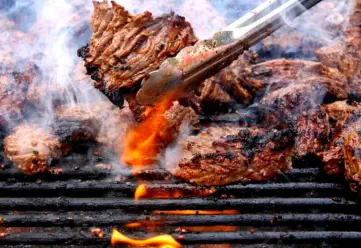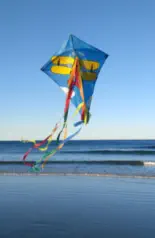Meat Day – Burnt Thursday
On the Thursday of the first week of Carnivale, Greeks celebrate
“Tsiknopempti” (Burnt Thursday). This takes place eleven days before
Clean Monday. On this particular Thursday, everyone grills and eats
meat. There are street sellers with mobile grills and the smell of grilled
meat (“tsikna”) and smoke fills the air and so it is also known as
Smelly Thursday
In the past, the kites used to be made by the father or grandfather of the family and so the art of kite making was passed down. However, nowadays,
most people buy a kite instead of making it and they can be seen for sale in many shops and street markets. Clean Monday is a beautiful sight; many
families head to the beach or countryside to fly the kites and have a picnic.
For the Christian Orthodox church, the kite represents the human soul, which flies in the sky free and pure to meet the Creator. Believers are getting
ready for the Resurrection of Jesus Christ and the Orthodox Easter to come.
Clean Monday is meat-free and dairy-free and will include the following food:
Lagana: this is a special bread prepared specifically for this day. The flat bread is prepared without yeast.
Tarama or Taramasalata: this is an authentic Greek dip, consisting of mashed potatoes, fish roe, olive oil, lemons, onions, and breadcrumbs.
Seafood: as meat is a no-no, all kinds of seafood are eaten on this day. Grilled octopus, grilled or stuffed squid, oysters and mussels to name just a few.
Olive oil: plays a major part on Clean Monday’s table. Olive oil is the perfect accompaniment to a slice of lagana bread.
Fasolada: this is a white bean soup that is usually referred to as the “National Dish” of Greece. It is made from white beans, vegetables, tomato sauce,
onions, and water. It is a hearty soup and is often accompanied by salted sardines.
Halva: this is the most common dessert during Lent and the shelves in supermarkets are piled high with it. There are two types - one consists of
semolina pudding and raisins and the other is made out of sesame tahini. The second one is more common for Clean Monday.
Clean Monday
Potomos Beach, Malia, Crete
Everyone takes to the beach to fly their kites….
Cheese Week
Tyrini Week (Cheese week) takes its name from the Greek word for cheese “Tyri”. It is the
last week of Carnivale before the start of Lent, which begins on Kathara Deftera (Clean or
Ash Monday). All food, except red meat and chicken, are permitted during this week, but
the main event is cheese and dairy products. There is an opportunity to use up anything
already in the fridge, which would otherwise spoil during the 40 days of Lent. It’s also an
opportunity to gorge on feta, which the Greeks sorely miss during Lent.
Followers of the Greek Orthodox religion will only eat a pescatarian diet (a vegetarian diet
that includes fish and seafood) during cheese week.



.webp)
1.webp)

Neapoli Lent Celebrations
Meat Day – Burnt Thursday
On the Thursday of the first week of Carnivale, Greeks celebrate “Tsiknopempti” (Burnt Thursday). This takes place eleven days before Clean Monday. On this particular Thursday, everyone grills and eats meat. There are street sellers with mobile grills and the smell of grilled meat (“tsikna”) and smoke fills the air and so it is also known as Smelly Thursday
Potomos Beach, Malia, Crete
Everyone takes to the beach to fly their kites….
Clean Monday
In the past, the kites used to be made by the father or
grandfather of the family and so the art of kite making
was passed down. However, nowadays, most people buy
a kite instead of making it and they can be seen for sale
in many shops and street markets. Clean Monday is a
beautiful sight; many families head to the beach or
countryside to fly the kites and have a picnic.
For the Christian Orthodox church, the kite represents
the human soul, which flies in the sky free and pure to
meet the Creator. Believers are getting ready for the
Resurrection of Jesus Christ and the Orthodox Easter to
come.
Clean Monday is meat-free and dairy-free and will include
the following food:
Lagana: this is a special bread prepared specifically for
this day. The flat bread is prepared without yeast.
Tarama or Taramasalata: this is an authentic Greek dip,
consisting of mashed potatoes, fish roe, olive oil, lemons,
onions, and breadcrumbs.
Seafood: as meat is a no-no, all kinds of seafood are
eaten on this day. Grilled octopus, grilled or stuffed squid,
oysters and mussels to name just a few.
Olive oil: plays a major part on Clean Monday’s table.
Olive oil is the perfect accompaniment to a slice of lagana
bread.
Fasolada: this is a white bean soup that is usually
referred to as the “National Dish” of Greece. It is made
from white beans, vegetables, tomato sauce, onions, and
water. It is a hearty soup and is often accompanied by
salted sardines.
Halva: this is the most common dessert during Lent and
the shelves in supermarkets are piled high with it. There
are two types - one consists of semolina pudding and
raisins and the other is made out of sesame tahini. The
second one is more common for Clean Monday.
Cheese Week
Tyrini Week (Cheese week) takes its name from the Greek
word for cheese “Tyri”. It is the last week of Carnivale before
the start of Lent, which begins on Kathara Deftera (Clean or
Ash Monday). All food, except red meat and chicken, are
permitted during this week, but the main event is cheese
and dairy products. There is an opportunity to use up
anything already in the fridge, which would otherwise spoil
during the 40 days of Lent. It’s also an opportunity to gorge
on feta, which the Greeks sorely miss during Lent.
Followers of the Greek Orthodox religion will only eat a
pescatarian diet (a vegetarian diet that includes fish and
seafood) during cheese week.




